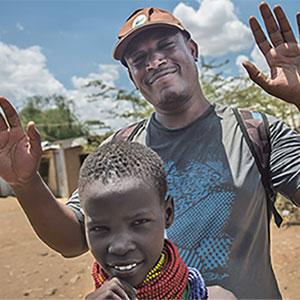
Source: New Internationalist
In Kakuma refugee camp, northwest Kenya, journalist Tolossa Asrat is investigating a murder. Jumping on the back of a bodaboda (motorbike taxi), he weaves through the dusty tracks between tents and shelters, until he reaches the home of a witness.
They sit on a mat in the shade, hidden from curious eyes, to carry out the interview. Haltingly, the witness says he was among a group of refugees who were on their way home from fundraising for their church when they were ambushed by men he believes were from the local Turkana community. Everyone scattered, later realizing one of their companions had been killed.
Asrat is the editor of Kanere (kanere.org), short for Kakuma News Reflector – the only fully independent, refugee-run news outlet operating out of the camp. The beat of Kanere journalists includes local disputes and corruption, complaints against the UN Refugee Agency and associated NGOs, and policies that affect Kakuma, a camp established in 1992 and now home to more than 180,000 refugees.
‘We need more than rations,’ explains Asrat, who came here from Ethiopia. ‘We want to express our views and be heard.’ He heads a team of nine, including Somalis, Sudanese, Congolese and Ugandans, all volunteers who put in time when they can. Staff turnover is high; some volunteers are resettled to other countries, while others have quit, worried about a backlash from camp authorities.
Okello Omot, 24, started working with Kanere as a teenager. He arrived in Kakuma aged 11, after his parents died and his brother was arrested in Ethiopia.
For a long time, Okello says, he was very isolated. ‘When I was sick there was no-one to take me to hospital,’ he remembers. He joined a journalism club at school in the camp, and eventually met the rest of Kanere. ‘I realized that what they are doing is in my blood.’
Reporting in a refugee camp is not without its challenges. When breaking news happens, Okello sometimes can’t afford transport or has no phone credit to alert other staff. He’s also afraid of the police, who appear to have ties to many of the reported crimes, including robberies and rapes.
‘It is very difficult to get accurate information,’ he says. ‘Rumours are spread a lot. People are very frightened.’
Each evening, back in his own shelter, Asrat waits for the electricity to come on so he can begin to type up the latest articles. Until recently, Kanere had just one old laptop, with a worn-out battery, which only worked when plugged into a mains connection.
The news outlet now receives $22 a month, thanks to online fundraising. Its editors say they want to raise enough to expand their staff, and hopefully get some more women on board, who can expand the range of stories they cover.
Asrat says he’s keen to speak to refugee journalists in camps across the world, who may be interested in setting up similar operations.
‘As human beings, we don’t only need food relief, but also an independent media voice – [it’s] an important tool for any democratic society, including refugee camps.’
